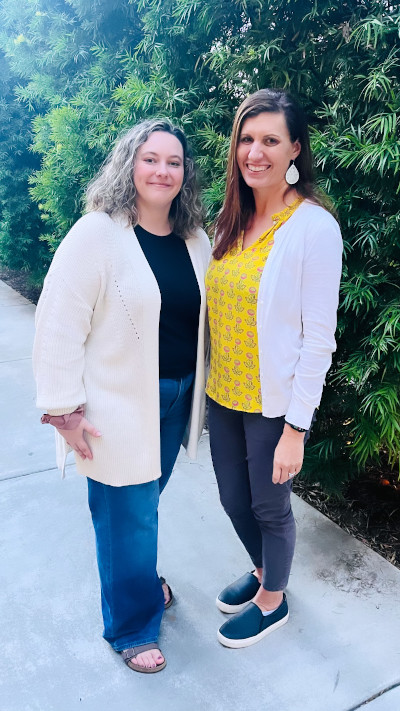College of Education and Human Development
School of Education Faculty and Doctoral Candidate Partner with West Virginia Birth to Three to Make Early Intervention Services for Young Children More Equitable through Family-Centered Practice
March 5, 2024
Christan Coogle, associate professor in the Special Education program within the School of Education at George Mason University, and Clarissa Wade, a doctoral candidate at Mason pursuing her PhD in Education with a specialization in Early Childhood Special Education and Special Education, are working in support of a training initiative with West Virginia Birth to Three. West Virginia Birth to Three provides services for families who have children under the age of three who have a disability (e.g., Cerebral Palsy, autism spectrum disorder), developmental delay (e.g., language, social emotional) or who may be at risk of a delay (e.g., low birth weight) in their development. Early intervention services focus on support to meet both child and family outcomes.
The Mason team is designing professional development that ensures early intervention practitioners in West Virginia are well-qualified to engage in family-centered services to meet the needs of infants, toddlers, and their families in their natural environments such as homes and communities. This professional development emphasizes the vital role that parents, families, and caregivers play in implementing interventions for their young children. It also enhances the ability of practitioners to better support parents by providing coaching, teaching strategies, and other techniques aimed at helping parents evaluate the needs and progress of their child.
The West Virginia Birth to Three statewide system is funded by the West Virginia Department of Health and Human Services— and serves as the lead agency for implementing Part C of the Individuals with Disabilities Education Act (IDEA) currently under the leadership of Mel Woodcock. This provision of the law requires early intervention services for infants and toddlers with delays or disabilities with the goal of enhancing the capacity of families to meet the developmental needs of their young children, minimizing the need for special education services when they reach school age, and maximizing opportunities for independence later in life.

Clarissa Wade (left) and Christan Coogle are partnering with the "West Virginia Birth to Three" statewide early intervention system.
The Mason Team Focuses on the Early Intervention Needs of Young Children in Rural Communities
Coogle says that although early intervention services have been provided for decades, there are still many families, especially families from low-income and culturally diverse backgrounds, who do not have access to the high-quality early intervention services they are entitled to. She points out that in underserved rural communities there is a significant association between poverty and poor developmental outcomes. Practitioners often travel hours and hours during the week to engage in home visits. “For this reason,” Coogle stated, “we had to think about what can be both effective and feasible in addressing the unique needs of a rural community. Technology-enhanced support has been one way we have tailored our approach.”
Coogle explains that following numerous conversations with intervention practitioners, state administrators, families, higher education faculty, and students it became clear that practitioners in rural West Virginia needed support in the delivery of family-centered services and in transitioning knowledge into application. In response, a team of leaders including early intervention practitioners (e.g., Sheila Zickefoose, Kristy Stout, Renee Morris), administrators (e.g., Mel Woodcock, Wendy Miller, Susan Rispress, Sarah Feick, Kately Thaxton), families (Katie Heidel, Kristy Stout and Wendy Miller), and higher education personnel (e.g., Christian Coogle) and doctoral students (e.g., Clarissa Wade) developed a tiered system of support with both an overview course and five communities of practice to support implementation of family-centered practices. “Using a tiered approach to support personnel demonstrates a true shift in mindset,” Coogle states. “Instead of us asking the question, ‘why are practitioners unable to adopt these practices?’ we are asking, ‘what supports can we put in place to help all practitioners to be successful?’”
The Family Guided Routines-Based Intervention (FGRBI) Model
The tiered approach focuses on 1) individualized, culturally responsive services and supports; 2) everyday activities, routines, and places; 3) functional participation-based outcomes; 4) embedded evidence-based instruction; and 5) caregiver coaching. These five components are part of the Family Guided Routines-Based Intervention (FGRBI) model developed by Dr. Juliann Woods which emphasizes the importance of delivering early intervention services within the child and family’s natural environments. Coogle developed an interest in this approach during her time at Florida State University where she studied under early intervention international experts Drs. Julian Woods and Mary Frances Hanline before accepting a faculty position at West Virginia University.
“I really wanted to teach the early intervention course given my training at Florida State...and to my fortune, which I did not realize at the time, my Department Chair [at West Virginia University] really valued the unique experiences, training, and expertise of each of the faculty within our Department, including those with a background in early intervention,” Coogle stated. “I knew if I had any chance of teaching that course, I needed to gain additional experience as an early intervention practitioner. I also thought this would be a good way to enhance my courses through bringing in additional practical experiences. I went through all the onboarding training that an early intervention practitioner takes in West Virginia.” It was during this period of time that Coogle first connected with individuals who were a part of the West Virginia Birth to Three system. The first training was delivered by Sheila Zickefoose and Coogle noted, “I knew I had found my people.”
Since making those early connections, Coogle has continued to be involved with West Virginia Birth to Three and has been instrumental in collaboratively developing the content that forms the foundation of the professional development provided to early intervention practitioners through this project. Assisting in this effort from Mason is Clarissa Wade, who is working on her PhD under the mentorship of Coogle and who is a West Virginia native. “Clarissa is such a huge asset to the team as she is so skilled in adult learning theory and providing engaging application opportunities and feedback,” Coogle stated. Wade expressed her gratitude for the chance to work with West Virginia Birth to Three alongside Coogle emphasizing, “I first met Dr. Coogle as a student enrolled in one of her early intervention courses at West Virginia University nearly a decade ago. She was very committed to supporting practitioners across the state then and continues to be now, even after leaving the university. As a West Virginia native, I truly believe country roads will always bring me home—and this initiative allows me to stay connected. I’m honored to be a part of this partnership to help increase high-quality early intervention services for the kind, hard-working families in the mountain state who far too often are left without access to resources they are entitled to.”
Challenges Ahead and the Need to Build Capacity
Reflecting on future challenges, Coogle remarked, “We now have close to 100 participants engaging in our monthly communities of practice so we need to determine how we might best build capacity to continue to support practitioners and the families they serve...We have seen the immeasurable value of resources and connection which West Virginia has been committed to under the former and current leadership of Pam Roush and Mel Woodcock, and we must continue to raise up a next generation so that there is a generation of scholars left behind to continue to push the field forward when our time has come to an end.”
To learn more about Mason’s Special Education program, please visit the program website.
